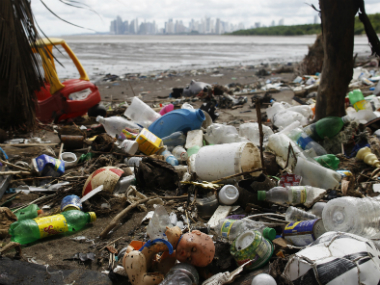On the fourth day of the
statewide plastic ban , Maharashtra woke up to news that pointed to two things — one, the government did not think its plan through before implementing it, and two, it weakened its intent by modifying the entire initiative. The government should, first and foremost, order big manufacturers to change their packaging. With the large market that Maharashtra offers and the state’s high Gross Domestic Product and per capita income, these companies would have good reason to comply with the order.
Big manufacturers got by before plastic became an everyday necessity, and it should be no different now. On Monday, the third day of the ban, the government has
permitted the use of PET bottles, provided that they are converted to pellets for recycling, carry barcodes to identify the bottlers and work with NGOs and ragpickers to ensure that the pellets are recycled. [caption id=“attachment_4429425” align=“alignleft” width=“380”] Plastic pollution. Reuters.[/caption] The state is also expected to
allow retailers to pack groceries in pouches made of plastic over 50 microns, again with conditions such as bearing the source and setting up collection and recycling mechanisms. This was something the organised dairy sector had claimed it could not handle. It is odd to see the government give in to the demands easily as complaints from citizens about the plastic ban have been negligible in comparison. Organised groups and lobbies have been at it to break the apparently not-so-resolute government’s plans. It is axiomatic that lobbies prevail while citizens lose out almost always. When the structured, politically-influential dairy sector has pleaded helplessness, how one can expect the retail sector to deal with the new rules is something the government has not explained. The state has also not defined who can be considered a “retailer”. If it refers to organised retailers like chains of departmental stores, then the government has not taken into consideration the smaller vendors in semi-urban areas and villages where handing over goods in plastic pouches is the norm. This is clearly discriminatory. Just walk around a departmental store and look for items using plastic. You would be surprised by
the amount of plastic and related non-degradable material they use at the store to pack a kilogram of dal in comparison to what your neighbourhood grocer would use. He is not someone who can use barcodes, collect and recycle the plastic. No doubt, the thin plastic bags people use to carry vegetables and tea when bought from roadside vendors are an environmental hazard. They are not recyclable, choke drains and cause waterlogging rather quickly. Even ragpickers treat them with disdain. To think that discarded plastic that is thicker does not pose the same challenges is to live in a fool’s paradise. The relaxations — what about milk sachets, for instance? — are likely to weaken the resolve of citizens who have readily complied with the ban and are easing themselves into it by changing their way of life. It defies logic to believe that the civic bodies that miserably failed to implement the earlier ban on thinner plastic will be able to deal with the latest ban, which allows something for someone and not for others. Like with the earlier ban on plastic under 30 microns and under 50 microns, the nod and wink will be back.
Despite the plastic ban, the Maharashtra government has decided to allow the use of PET bottles, but with caveats.
Advertisement
End of Article
Written by Mahesh Vijapurkar
Mahesh Vijapurkar likes to take a worm’s eye-view of issues – that is, from the common man’s perspective. He was a journalist with The Indian Express and then The Hindu and now potters around with human development and urban issues. see more


)

)
)
)
)
)
)
)
)



